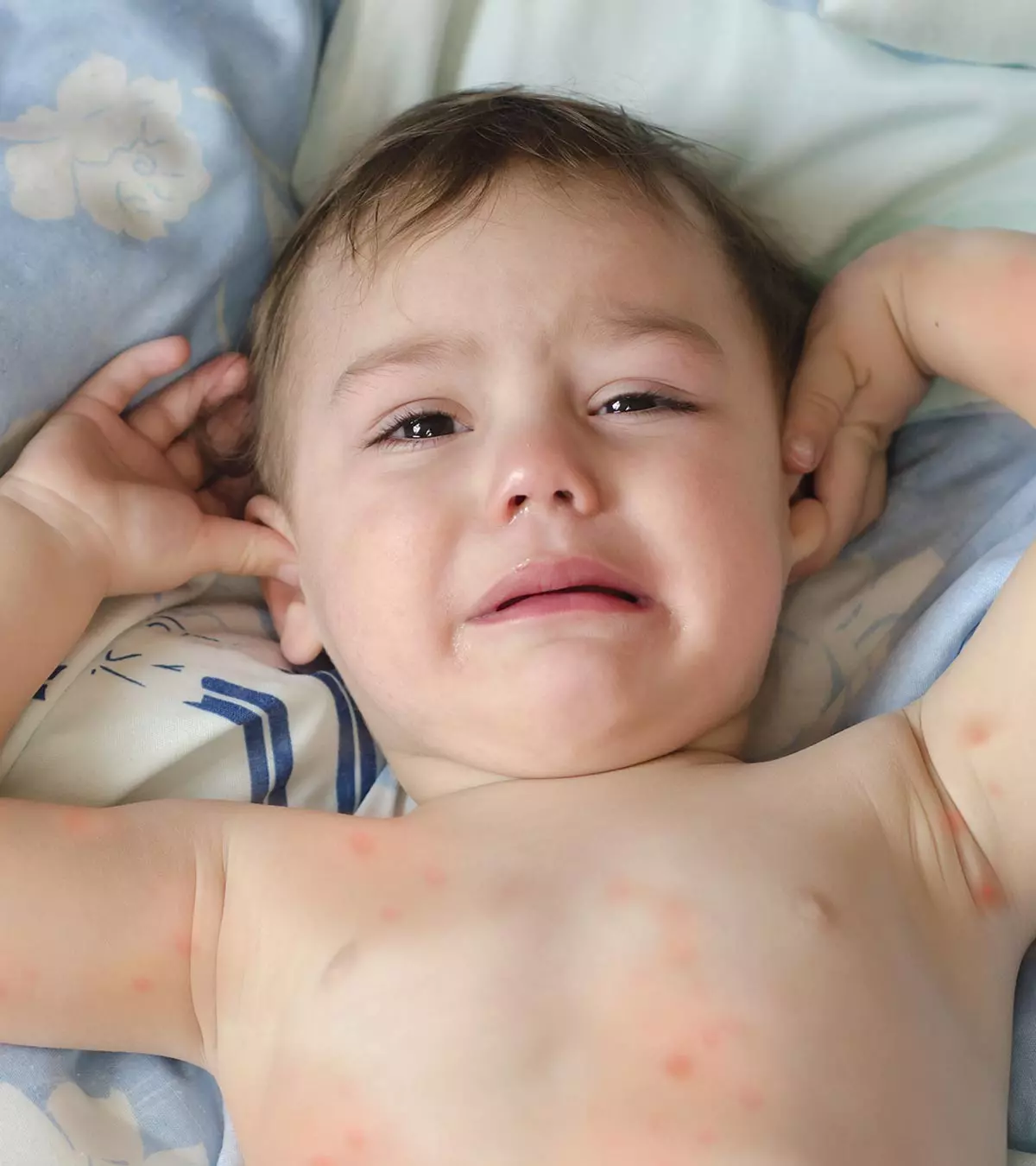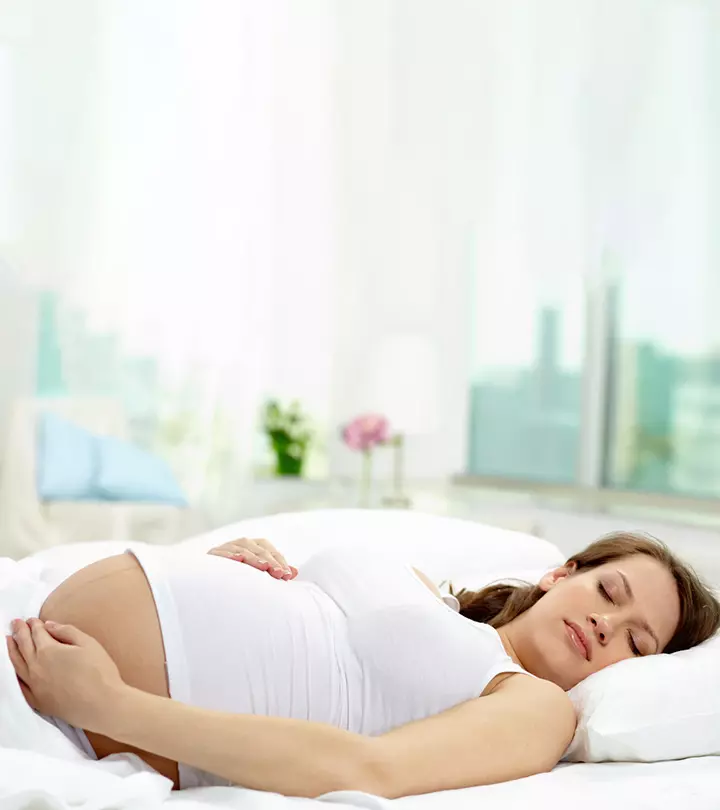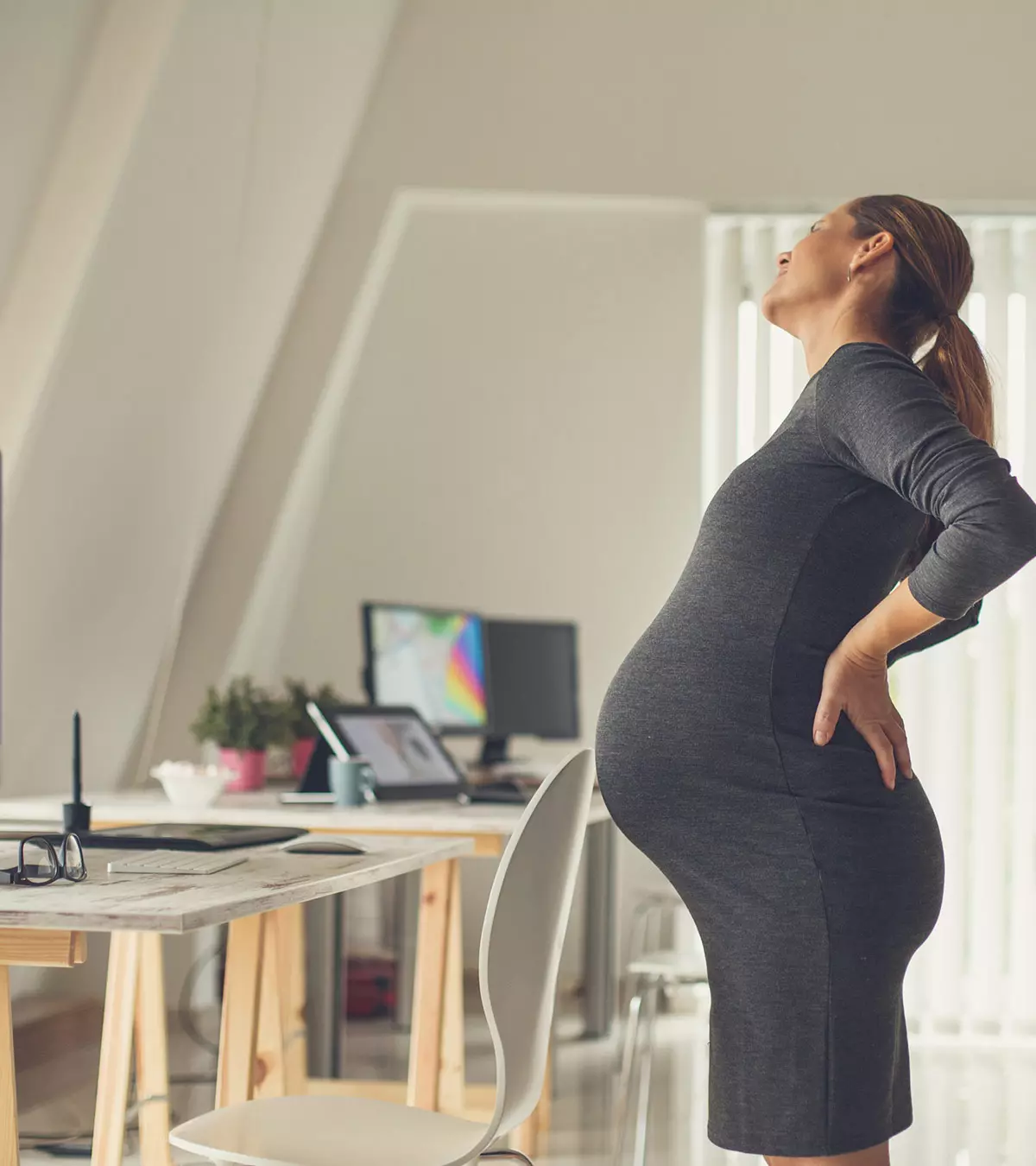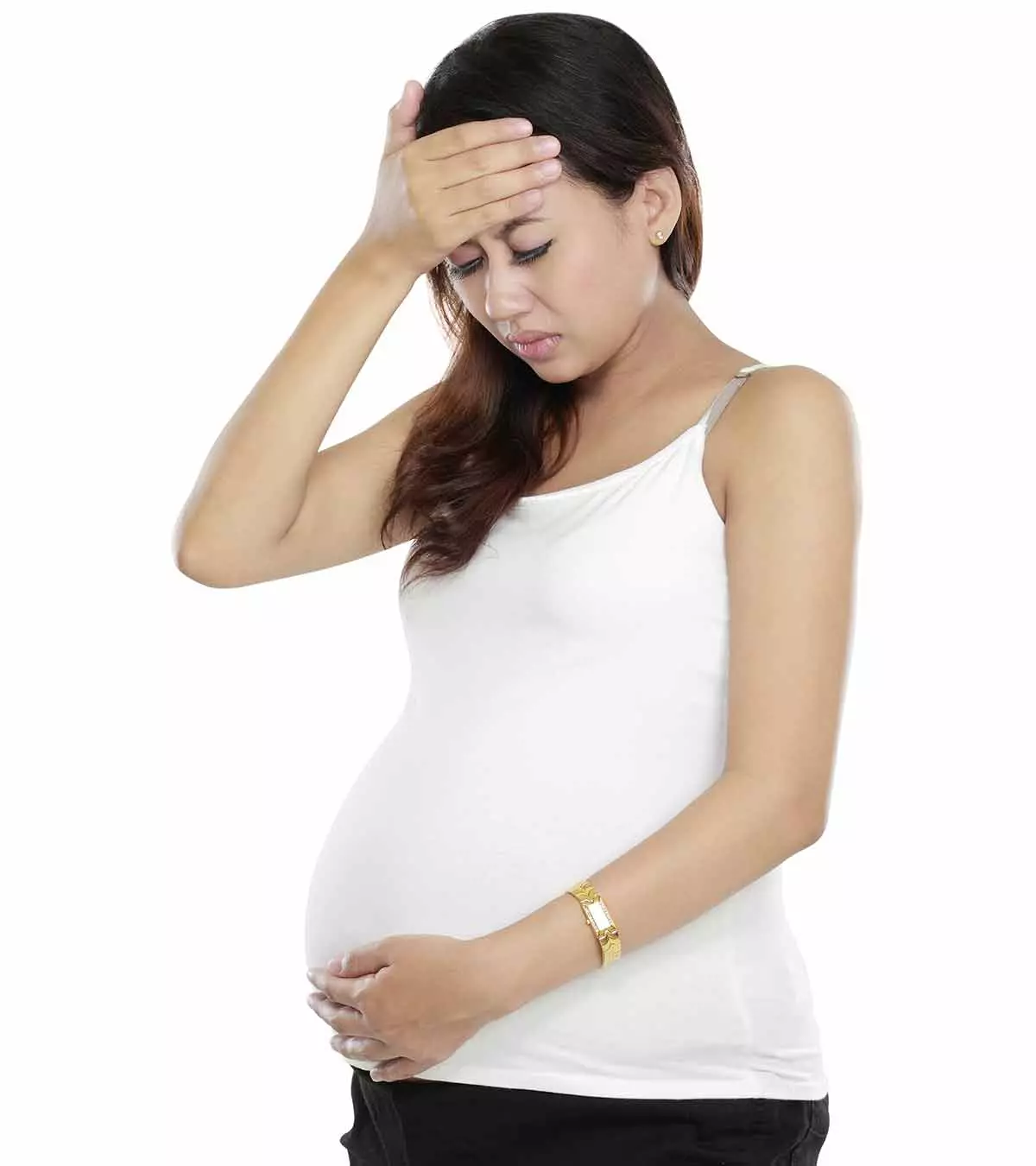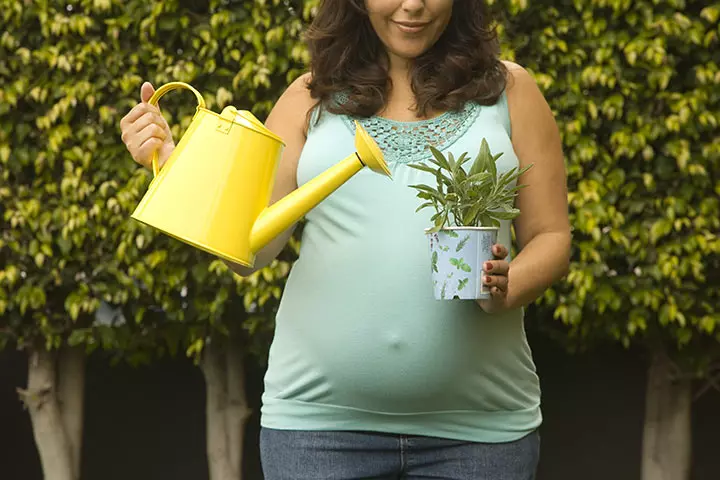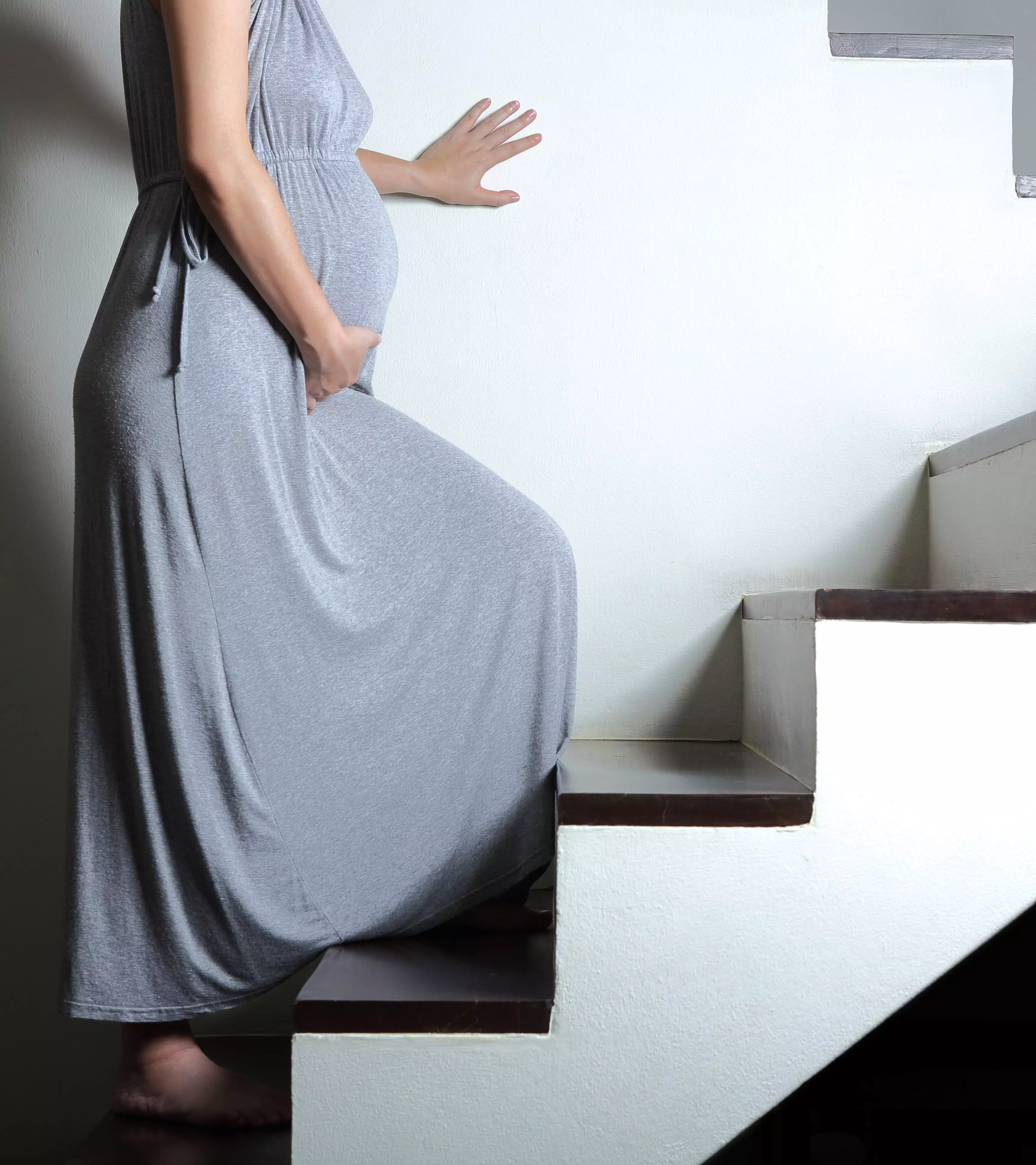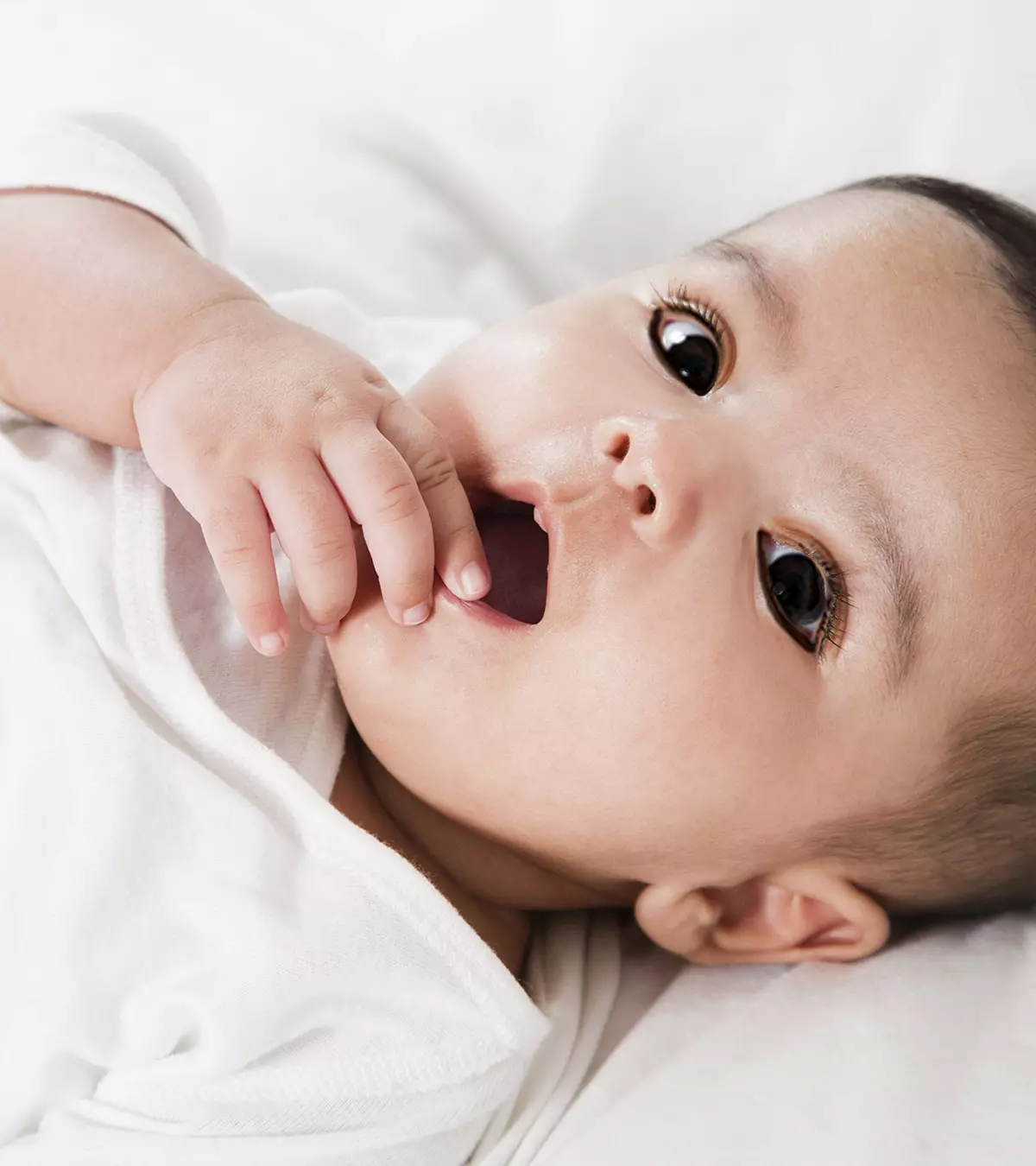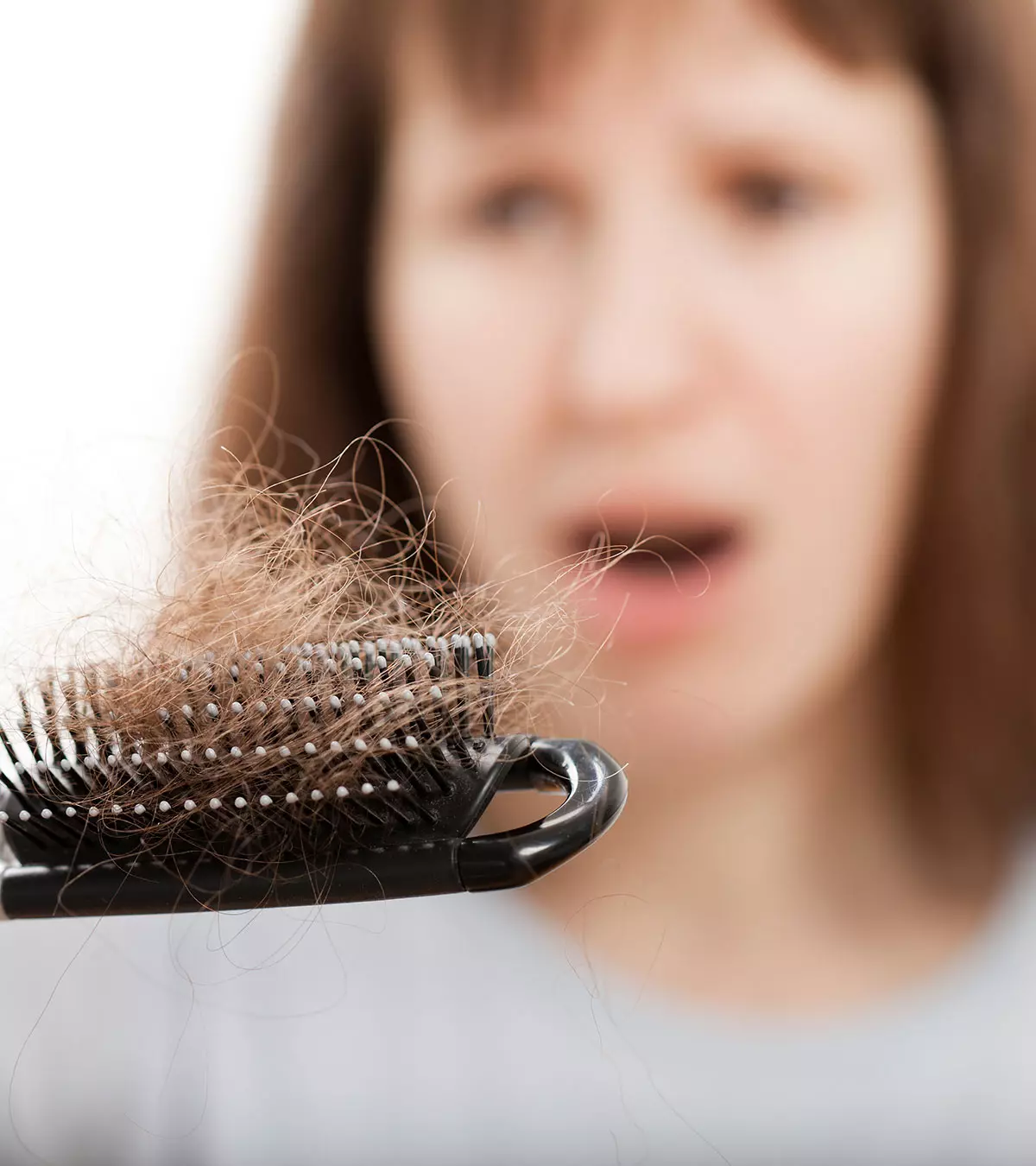
Image: iStock

Women experience hair fall in pregnancy due to various reasons. Hair grows in a cycle; when 90% of the hair grows, 10% enters the telogen or resting phase. After resting for two to three months, the hair falls, and new growth occurs.
Although some pregnant women experience hair fall, most women experience a prolonged resting phase, causing the hair to appear thicker since there is no hair fall (1). However, they may experience sudden hair loss when a large quantity of hair moves out of the resting phase.
Read on to know the reasons for hair fall in pregnancy and how to control it.
Key Pointers
- Approximately 40-50% of pregnant women may experience temporary hair loss.
- Hair loss during pregnancy may be caused by poor nutrition, illness, genetics, hypothyroidism, skin or hormonal diseases.
- Using mild shampoos, massaging with organic products, coconut oil, amla powder, and maintaining a healthy diet can help reduce hair loss.
- It is advisable to avoid using heat or chemical treatments on hair during pregnancy.
- However, if there is an abnormal amount of hair loss, pregnant women should seek medical advice for proper treatment.
Is Hair Loss Normal During Pregnancy?
Small patches of hair loss are quite normal during pregnancy (1). Research states that nearly 40 to 50% of pregnant women suffer from hair loss, but the good thing is that this is just a temporary phenomenon.
Hair may become drier because of the progesteroneiA female reproductive hormone that plays a vital role in menstruation, pregnancy, and breastfeeding. hormone that is released in high amounts during pregnancy. This can make the hair break and crack near the roots, mostly in the later stages of pregnancy.
Hair loss during pregnancy could be due to various reasons. But if the loss is unusual, you should check with your doctor to know the exact cause behind that.
What Causes Hair Loss During Pregnancy?
Don’t worry if hair fall during pregnancy is more than what it was during normal times. Hormonal fluctuations and physical changes could be responsible for this. It is usually temporary and lasts until the baby is born.
Other reasons for hair fall during pregnancy include:
1. Poor nutrition
Your body needs more nutrition during pregnancy. The iron requirement is high. Insufficient intake could lead to iron deficiency anemia-induced hair loss (2). Also, a shortage of protein, prenatal vitamins, and minerals (such as zinc) in the body can be a contributing factor. Nausea and vomiting in the first trimester may result in poor nutrition. Moreover, the intake of excess vitamins, such as the retinoliA fat-soluble form of vitamin A naturally found in plant and animal-based foods, also available as a dietary supplement. form of vitamin A, can also cause hair loss (3).
2. Illnesses
Some illnesses, such as gestational diabetes and ringworm (a fungal infection) can cause hair loss. Also, certain medications such as drugs to treat high blood pressure, depression, and anxiety, could increase the risk of hair fall. If you observe increased hair fall while on medication, update your doctor about it.
3. Usual hormonal changes
Hair changes during pregnancy can also result from the changes in hormones that are normal in this phase. The fluctuation of hormones halts or interrupts the usual hair growth cycle, leading to excessive hair shedding or telogen effluvium (4). This condition will disappear in a few months.
4. Genetics play a role
Hair loss has a genetic background too, which means if your parents had the same problem, you too are likely to be affected. Medication and treatment could be helpful in tackling hair fall that has a genetic origin (5).
5. Deficiency in thyroid hormone
Thyroid disorders such as hypothyroidism is characterized by a decline in the production of thyroid hormone in the body and is common among women today. The thyroid hormone is responsible for maintaining the basal metabolic rate, digestive system, mental health, and even the nails and hair. The deficiency of this hormone could cause the hair to fall (6).
6. Polycystic ovarian syndrome
PCOS is a hormonal imbalance that causes the ovaries to produce male hormones in excessive quantities. According to the US Centres for Disease Control and Prevention (CDC), PCOS affects 6% to 12% (approximately 5 million) of women of reproductive age in the US. While most women affected by this condition experience increased hair growth, hair loss may also be noted around the scalp region (7).
7. Skin diseases of the scalp
Skin allergies and conditions that impact scalp health could also contribute to the thinning of hair and hair loss (4).
8. Reproductive causes
Terminating the usage of birth control medications or any other birth control method can cause hair loss. You may also experience hair loss as a result of miscarriage, abortion, and stillbirth.
Hair loss is not a medical emergency. But the underlying cause, such as a nutrient deficiency or illness, can be harmful. You should consult an obstetrician if you find excessive hair shedding during pregnancy. But if it is not alarming, make a few changes to your routine and see.
How To Control Hair Fall During Pregnancy?
During pregnancy, you can take steps for better hair care to minimize hair loss or improve the overall health of your hair.
- Do not overbrush your hair as it can cause further damage.
- Do not engage in hair styling practices such as tight hairstyles including ponytails, cornrows, braids, hair weaves, and hair rollers as they can result in hair pulling and stress and hair loss due to breakage.
- Do not use straightening treatments or chemical dyes as they make the hair brittle and dry.
- Use milder shampoo and conditioner.
- Use a detangling comb to brush your wet hair.
- Massage the scalp to stimulate blood circulation.
- Avoid using hair colors as harmful chemicals present in them can lead to excessive hair fall.
- Eat lots of fruits and vegetables containing flavonoidsiA group of naturally-occurring antioxidant and anti-inflammatory compounds found in plants and fruits. and antioxidantsiNatural or synthetic substances that may prevent or slow down cell damage caused due to harmful molecules called free radicals. , which help in protecting the hair folliclesiTiny pores on the skin surface from where the hair grows. from damage and stimulate hair growth.
- Do not use too much heat to style your hair.
These above tips can help to reduce hair loss to an extent. You may follow them, along with a few harmless home remedies.
 Quick tip
Quick tipHome Remedies For Hair Fall During Pregnancy
Try out these simple solutions at home and see the difference. This may help prevent hair fall.
1. Go organic
Using natural and organic products is one of the best steps to reduce the risk of hair fall due to skin infections and allergic reactions of the scalp. Natural products are perfectly safe for people with sensitive skin.
2. Warm oil massage
Massaging the scalp with lukewarm oil is thought to help control hair fall naturally. Coconut, jojoba, almond, olive oil, and mustard oils are believed to be the best for nourishing the scalp with a massage.
3. Aloe vera gel
Aloe vera
extracts help in dealing with most skin disorders. Its gel, when applied to the scalp, could treat hair loss occurring due to dryness and infection of the scalp.
4. Amla to the aid
Indian gooseberry, also known as amla, is one of the best natural remedies for hair fall. Amla powder, when taken orally or massaged as oil into the scalp, strengthens hair and prevents hair fall.
5. Antibacterial neem
Neem is yet another effective herbal remedy for tackling hair fall due to skin infections. Neem is a natural antibacterial agent that prevents the growth of bacteria. You can make a paste of fresh neem leaves and apply on your scalp.
6. Fresh coconut milk
Massage half a cup of fresh coconut milk onto the scalp with your fingertip. Leave it for 20 to 30 minutes and rinse using a good herbal shampoo. Consider using fresh milk, not the tinned variety.
Some more combinations of home ingredients that can work:
7. A mixture of oils
Mix six tablespoons of castor oil and one-fourth teaspoon of lavender essential oil. Apply the mixture on the scalp and wash it off after an hour. However, get clearance from your doctor on using essential oils as a few are not recommended during pregnancy.
8. Citric lemon juice
Beat one egg and mix it with one tablespoon of lemon juice. Apply it on the scalp and leave for about 30 minutes. Rinse it. This not only helps prevent hair fall but could also make the hair thicker and silkier.
9. Soaked fenugreek seeds
Soak fenugreek seeds in water overnight. Prepare a fine paste out of them in the morning. Apply the paste on your hair and massage the entire hair. Wash it off after three to four hours. It not only stimulates hair development but also gives radiance.
10. Egg, yogurt, and olive oil
Prepare a paste of the above ingredients and apply once a week. This works as a deep-conditioning treatment for your locks.
Along with these above remedies, try changing your hair products to treat hair loss during pregnancy.
 Did you know?
Did you know?Self-Help Measures To Manage Hair Loss
Supplements and hair products also play a key role in controlling hair fall. You may try them along with home remedies. They may work wonders, but you should check them with your doctor before using them.
1. Supplements
You can add the following to your diet to reduce or control thinning hair.
- Biotin (8)
- Vitamin B complex
- Vitamin C
- Vitamin E
- Zinc
2. Shampoos and conditioners
It is usual for the hair to turn dry during pregnancy. To fight the dryness, you can change to a shampoo or conditioner that is more moisturizing than the current one. Choose hair products containing:
- Shea butter – adds moisture and prevents hair breakage.
- Coconut oil – seals in the moisture of the hair follicle.
- Aloe vera – deals with hair loss.
- Jojoba oil – natural humectants.
- Avocado oil – contains vitamins E, D, and potassium essential for the health of the hair.
 Quick tip
Quick tipTreatment For Hair Loss During Pregnancy
If there is extreme hair loss during pregnancy, in spite of your efforts to address it at home, then see a doctor. They may suggest a Trichotherapy regime or any other hair loss treatments that suit your condition.
Trichotherapy regime is a three-step regimen that targets hair loss in a holistic way. The regime contains three products: scalp drops, protein spray, and nutritional supplements, which encourage healthy hair growth. It helps normalize the hair cycle and reduces shedding.
Frequently Asked Questions
1. Are hair products such as hair serums and hair tonics safe for pregnancy?
Hair products are likely to be safe during pregnancy because studies show that they have less systemic absorption and do not cause significant adverse effects on the developing fetus. However, if you have wounds or burns on your scalp, you should be careful as the products may enter the body through these openings on the skin (10).
2. Is it safe to do hair treatment while pregnant?
Hair treatments with chemicals are considered to be safe during pregnancy. However, waiting until the second or third trimesters to treat your hair is recommended. Moreover, always get the treatment done in a ventilated area, wear gloves, and rinse your hair thoroughly for better safety (11).
3. How can a woman cope with the emotional impact of hair fall during pregnancy?
Hair fall is one of the side effects of pregnancy that an expecting mother might experience. However, they may take comfort in the fact that it is temporary. Mothers may consult doctors during this phase to understand the conditions contributing to their hair loss and take necessary measures. Furthermore, they may use gentle hair care products and connect with mothers going through a similar situation for support and learn their ways of self-care.
4. Is there any correlation between the severity of hair fall during pregnancy and the gender of the baby?
No, pregnancy hair fall is due to the drastic hormonal fluctuations and underlying pregnancy-related changes in the body. Thus, it is not related to the gender of the baby.
5. How long does hair loss typically last after giving birth?
According to the American Academy of Dermatology, hair loss in new mothers increases in the first four months postpartum, and normal hair growth is regained by the time the child turns one (9). Monica Caron, a mother, talks about her hair loss experience four months after having a baby, “One day while showering, I ran my fingers through my hair, and about a handful of hair came out. Hair was just constantly falling out. Hair was everywhere, all the time. There was nothing I could do about it (ⅰ).” This is, however, her encounter with the issue, which can vary from person to person. If you’re worried about hair loss after delivery, contact your healthcare provider for proper guidance.
Remember that you cannot control hair fall in pregnancy overnight. It takes some time for your hair to return to normal post-delivery. Incorporating postpartum skin care and hair care into your routine can also support your overall recovery, helping to nourish both your skin and hair as your body heals. Remain patient as your body, including your hair, can get back to the pre-pregnancy state with some effort and in time.
Infographic: Home Remedies To Prevent Hair Fall During Pregnancy
Many women experience changes in their hair when pregnant, which can lead to hair loss or thinning. While hair loss during pregnancy is common and usually temporary, there are steps women can take to help prevent or minimize hair loss. See the infographic below to learn practical tips for reducing pregnancy-induced hair fall.
Some thing wrong with infographic shortcode. please verify shortcode syntax
Illustration: Causes Of Hair Fall In Pregnancy And Remedies To Control
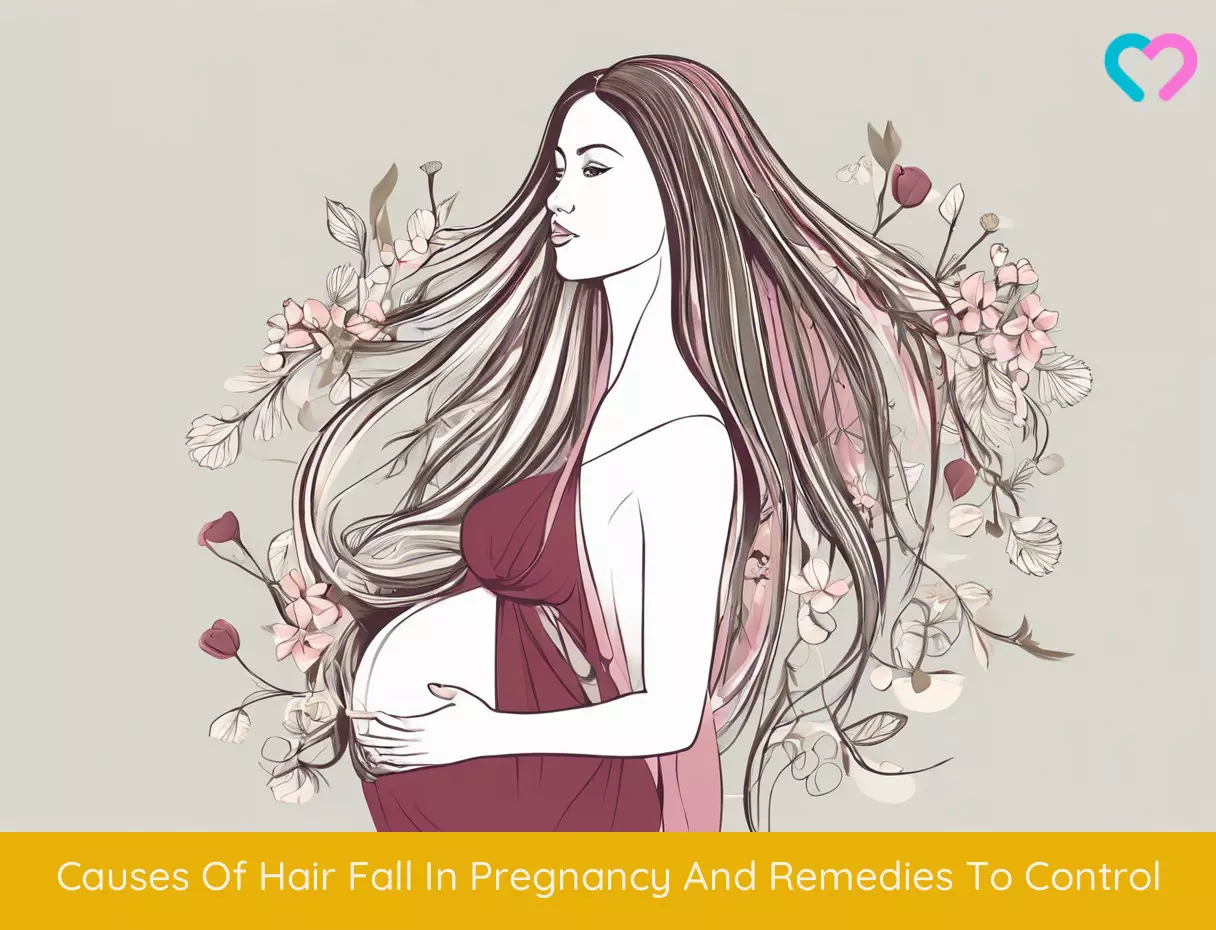
Image: Stable Diffusion/MomJunction Design Team
Personal Experience: Source
MomJunction articles include first-hand experiences to provide you with better insights through real-life narratives. Here are the sources of personal accounts referenced in this article.
ⅰ. My experience with hair loss after pregnancy;https://simplyintheflavor.wordpress.com/2015/06/05/my-experience-with-hair-loss-after-pregnancy-photo-included/
References
1. Nigel Hunt and Sue McHale; The psychological impact of alopecia
2. Noran M. Abu-Ouf and Mohammed M. Jan; The impact of maternal iron deficiency and iron deficiency anemia on child’s health
3. J Clin Psychiatry; Retinoic Acid and Affective Disorders: The Evidence for an Association
4. Melinda A Novak and Jerrold S Meyer; Alopecia: Possible Causes and Treatments, Particularly in Captive Nonhuman Primates
5. Lauren L Levy and Jason J Emer; Female pattern alopecia: current perspectives
6. Quan Q Dinh and Rodney Sinclair; Female pattern hair loss: Current treatment concepts
7. Polycystic ovary syndrome; The U.S. Department of Health and Human Services
8. Biotin; The United States National Library of Medicine
9. Hair Loss in new moms; American Academy of Dermatology Association
10. Angela Chua- Gocheco (2008); Safety of hair products during pregnancy; NIH
11. Hair Treatment During Pregnancy; American Pregnancy Association
Community Experiences
Join the conversation and become a part of our nurturing community! Share your stories, experiences, and insights to connect with fellow parents.
Read full bio of Dr. Burcu Saygan Karamürsel
Read full bio of Rebecca Malachi
Read full bio of Swati Patwal
Read full bio of Aneesha Amonz






